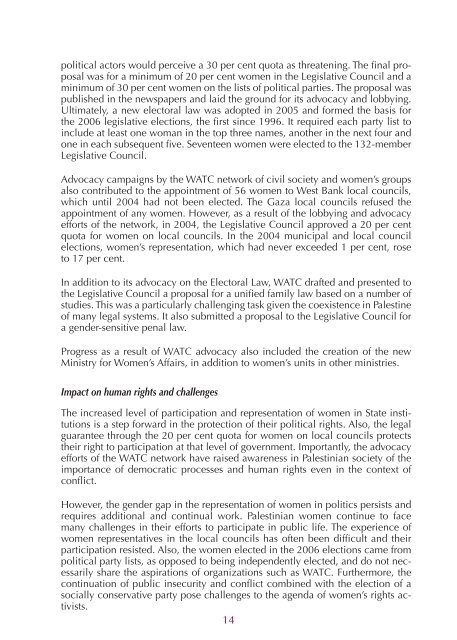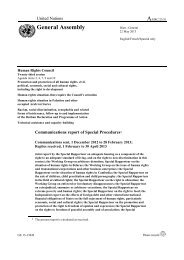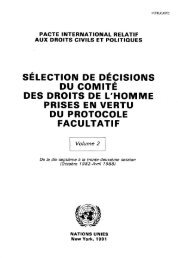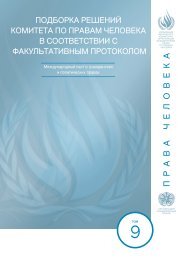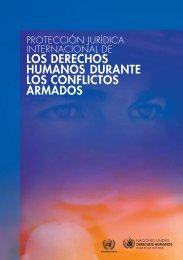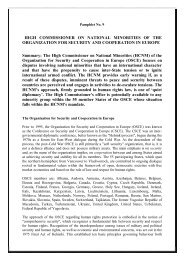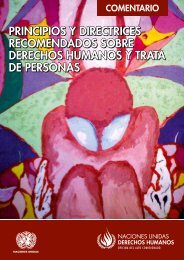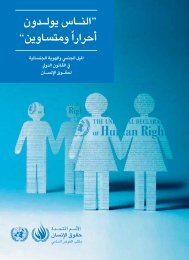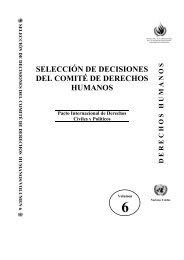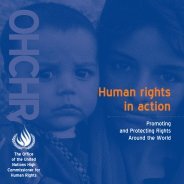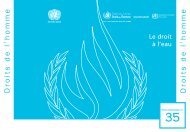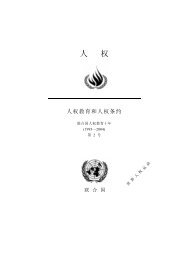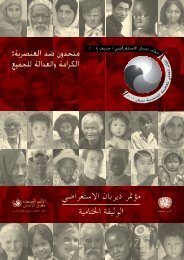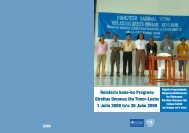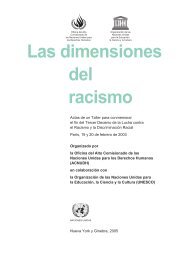good governance practices for the protection of human rights
good governance practices for the protection of human rights
good governance practices for the protection of human rights
Create successful ePaper yourself
Turn your PDF publications into a flip-book with our unique Google optimized e-Paper software.
political actors would perceive a 30 per cent quota as threatening. The final proposal<br />
was <strong>for</strong> a minimum <strong>of</strong> 20 per cent women in <strong>the</strong> Legislative Council and a<br />
minimum <strong>of</strong> 30 per cent women on <strong>the</strong> lists <strong>of</strong> political parties. The proposal was<br />
published in <strong>the</strong> newspapers and laid <strong>the</strong> ground <strong>for</strong> its advocacy and lobbying.<br />
Ultimately, a new electoral law was adopted in 2005 and <strong>for</strong>med <strong>the</strong> basis <strong>for</strong><br />
<strong>the</strong> 2006 legislative elections, <strong>the</strong> first since 1996. It required each party list to<br />
include at least one woman in <strong>the</strong> top three names, ano<strong>the</strong>r in <strong>the</strong> next four and<br />
one in each subsequent five. Seventeen women were elected to <strong>the</strong> 132-member<br />
Legislative Council.<br />
Advocacy campaigns by <strong>the</strong> WATC network <strong>of</strong> civil society and women’s groups<br />
also contributed to <strong>the</strong> appointment <strong>of</strong> 56 women to West Bank local councils,<br />
which until 2004 had not been elected. The Gaza local councils refused <strong>the</strong><br />
appointment <strong>of</strong> any women. However, as a result <strong>of</strong> <strong>the</strong> lobbying and advocacy<br />
ef<strong>for</strong>ts <strong>of</strong> <strong>the</strong> network, in 2004, <strong>the</strong> Legislative Council approved a 20 per cent<br />
quota <strong>for</strong> women on local councils. In <strong>the</strong> 2004 municipal and local council<br />
elections, women’s representation, which had never exceeded 1 per cent, rose<br />
to 17 per cent.<br />
In addition to its advocacy on <strong>the</strong> Electoral Law, WATC drafted and presented to<br />
<strong>the</strong> Legislative Council a proposal <strong>for</strong> a unified family law based on a number <strong>of</strong><br />
studies. This was a particularly challenging task given <strong>the</strong> coexistence in Palestine<br />
<strong>of</strong> many legal systems. It also submitted a proposal to <strong>the</strong> Legislative Council <strong>for</strong><br />
a gender-sensitive penal law.<br />
Progress as a result <strong>of</strong> WATC advocacy also included <strong>the</strong> creation <strong>of</strong> <strong>the</strong> new<br />
Ministry <strong>for</strong> Women’s Affairs, in addition to women’s units in o<strong>the</strong>r ministries.<br />
Impact on <strong>human</strong> <strong>rights</strong> and challenges<br />
The increased level <strong>of</strong> participation and representation <strong>of</strong> women in State institutions<br />
is a step <strong>for</strong>ward in <strong>the</strong> <strong>protection</strong> <strong>of</strong> <strong>the</strong>ir political <strong>rights</strong>. Also, <strong>the</strong> legal<br />
guarantee through <strong>the</strong> 20 per cent quota <strong>for</strong> women on local councils protects<br />
<strong>the</strong>ir right to participation at that level <strong>of</strong> government. Importantly, <strong>the</strong> advocacy<br />
ef<strong>for</strong>ts <strong>of</strong> <strong>the</strong> WATC network have raised awareness in Palestinian society <strong>of</strong> <strong>the</strong><br />
importance <strong>of</strong> democratic processes and <strong>human</strong> <strong>rights</strong> even in <strong>the</strong> context <strong>of</strong><br />
conflict.<br />
However, <strong>the</strong> gender gap in <strong>the</strong> representation <strong>of</strong> women in politics persists and<br />
requires additional and continual work. Palestinian women continue to face<br />
many challenges in <strong>the</strong>ir ef<strong>for</strong>ts to participate in public life. The experience <strong>of</strong><br />
women representatives in <strong>the</strong> local councils has <strong>of</strong>ten been difficult and <strong>the</strong>ir<br />
participation resisted. Also, <strong>the</strong> women elected in <strong>the</strong> 2006 elections came from<br />
political party lists, as opposed to being independently elected, and do not necessarily<br />
share <strong>the</strong> aspirations <strong>of</strong> organizations such as WATC. Fur<strong>the</strong>rmore, <strong>the</strong><br />
continuation <strong>of</strong> public insecurity and conflict combined with <strong>the</strong> election <strong>of</strong> a<br />
socially conservative party pose challenges to <strong>the</strong> agenda <strong>of</strong> women’s <strong>rights</strong> activists.<br />
14


